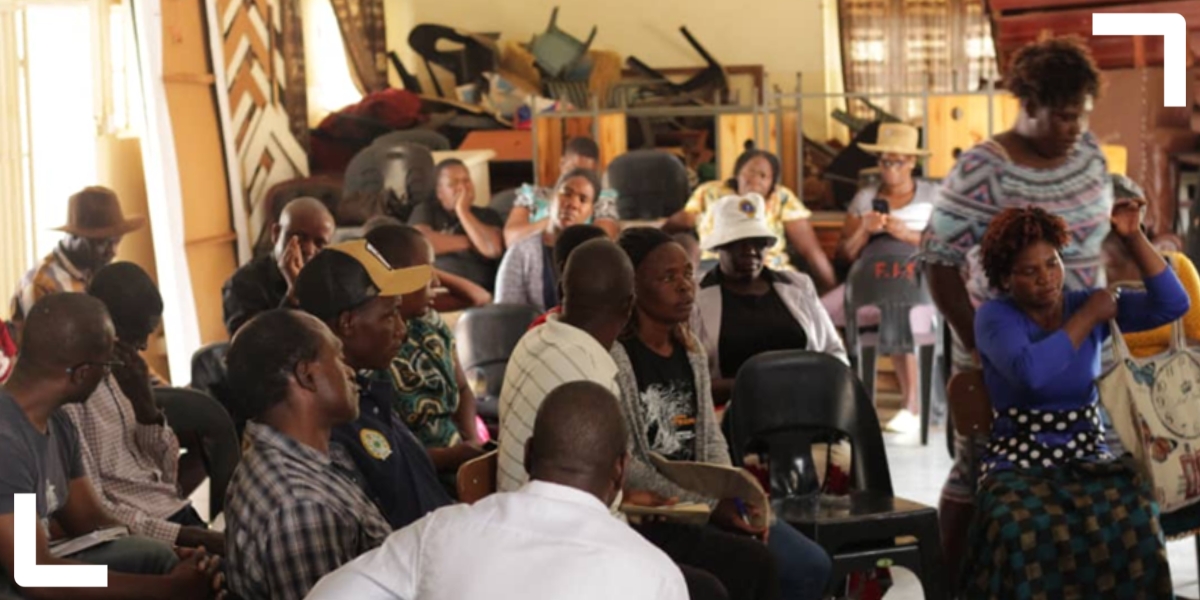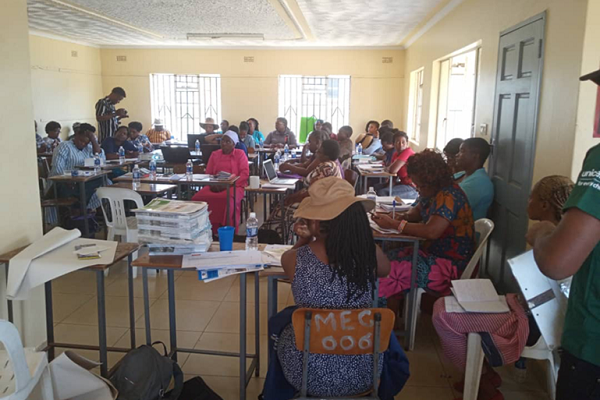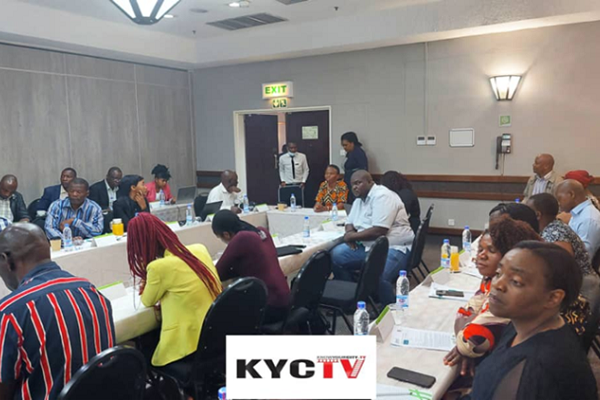By Evans Itayi Banana, ACRC Harare research uptake lead (Dialogue on Shelter for the Homeless Trust)
Democratising research processes has long been a contested subject. While co-production of knowledge presents vast opportunities for positive development outcomes, urban research processes often continue to exclude and marginalise vulnerable groups. In instances where attempts at inclusion have been made, they have largely been tokenistic, with communities coming in merely as data collectors.
The African Cities Research Consortium (ACRC) is reconsidering urban research processes through a community knowledge approach. This has entailed enabling marginalised and disadvantaged communities not only to participate meaningfully in the research process but, more importantly, to define the research agenda, engage with findings and contribute towards research uptake. Research in Harare covers four domains – informal settlements, neighbourhood and district economic development, structural transformation and land and connectivity – and is guided by political settlements and city of systems frameworks.
Why prioritise community knowledge?
Realising the challenges of African cities and the failure of development models to provide lasting solutions for African cities, the ACRC Harare research team embarked on a mission to revolutionise research, focusing on generation of knowledge. It is an attempt to break the biased knowledge generation cycle and theory production which contribute to the continuation of inaccurate global narratives that exclude disadvantaged and marginalised groups.
ACRC research is pursuing a much more rigorous and grassroots-led process that attempts to dismantle the data-related dynamics that perpetuate the exclusion of community voice, and replace them with inclusive knowledge generation approaches. The drive for community knowledge came from this understanding that the field of research is undergoing some structural changes and that urban transformation will be difficult to achieve by relying on knowledge creation practices that are informed solely by professionals and academics. The team therefore decided to move beyond an extractive logic, choosing to build mutual accountability platforms and community capacity as a way of improving the depth of research inquiries and expanding the knowledge horizon.
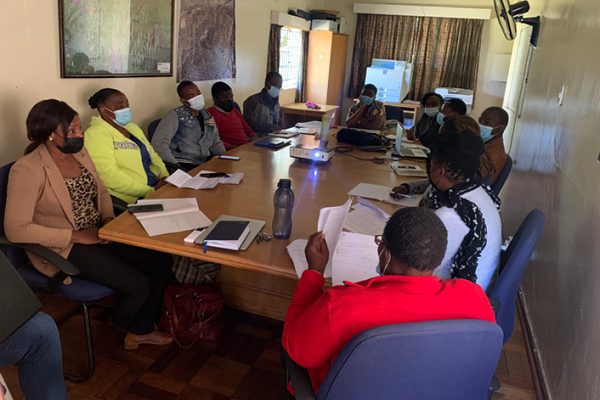
Community researchers and informal settlements, city of systems and uptake teams at the ACRC inception meeting in Harare.
Community knowledge: The process
In Harare, the process started with the ACRC research team reimagining the knowledge generation agenda and how it can facilitate urban transformation. In trying to address this gap, we used representatives of community organisations in the informal economic trading sector and informal settlement communities affiliated to Slum Dwellers International (SDI), known as Zimbabwe Homeless People’s Federation (ZHPF). ZHPF members were instrumental in providing entry points to gain access to the wider community. ZHPF has been using community-led documentation to legitimate their claims, to enhance community organisation, and to gradually demand space, through ensuring that their voice is audible in development processes that are normally the domain of professionals and the state institutions.
In our city research, we prioritised the democratisation of knowledge and the subsequent need to reframe relationships between communities, theory and practice. Thus, we deliberately attempted to focus on locating, at the core of the knowledge generation process, those experiencing poverty, homelessness and other forms of exclusion.
We used a number of approaches to turn our ambitious plans into practice:
1. Training community researchers
We identified seven people from target communities, comprising four women, one man and two youths. These seven participants joined the ACRC research team after a detailed project inception session outlining the research agenda, and the broader ACRC research plan and methodology.
2. Co-producing data collection tools
We also held a tool development and training session to involve more community members. The additional members included young people from KnowYourCity TV (KYCTV), who were responsible for documenting the data collection process, and community mobilisation team members, who are the key pillar of the SDI process. The research team considered this a priority, mainly due to the urgent need to produce sustainable solutions that connect academic findings and work to community needs.
Tool development and training session with community researchers and informal settlements domain team.
3. Community-led field research
Our field research was conducted together with community leaders and researchers. Data was collected using focus group discussions (FGDs) and interviews with key informants. Community leaders assisted in arranging meetings and interviews, while the community researchers led the execution of the FGDs and interviews. The FGDs were able to bring out the community perspective and rich experiences on how communities navigate political settlements issues when negotiating for land tenure security and urban services.
The community knowledge approach therefore helped in bringing out actual realities from the disadvantaged and marginalised communities, in contrast to narratives imposed by academics and professionals. Significant efforts were made in distilling the complexities of contemporary urban challenges into simple statements that were easy for communities to comprehend, so that they could contribute effectively. The research agenda was translated into local language, and flipcharts were used to note community contributions.
4. Community knowledge sessions
We held four community knowledge sessions with representatives from informal settlements and resident organisations from formally planned sections, which further enriched the knowledge generation process. These were dedicated discussion platforms exclusively targeting residents from disadvantaged and marginalised groups. The first three sessions were key in exploring the push and pull factors responsible for various forms of informality and in providing a rich understanding of the gatekeepers and potential pathways that the community perceives. One of the four sessions focused on priority complex problems (PCPs) and contributed in problematising issues affecting the city from a community perspective. The conversations provided communities with more space to inform the research and realign some of the data collection tools to be more useful in probing relevant issues.
“Most of our strategies are anchored on consensus building. We stand better chances of being heard by decisionmakers if we show cohesion at community level.”
– Dzivarasekwa community leader,
referring to how they engage competing views at settlement level
Women from Dzivaresekwa and Crowborough North informal settlements following proceedings closely during an uptake meeting in Harare.
Deeper perspectives around how communities negotiated for basic services and land tenure security, and how they pursue livelihoods and attract council investments, were attained using these sessions. Most importantly, integrating communities as part of the research team was instrumental in highlighting the institutions that communities created and for what ends. Communities explained their way of doing business and how that has graduated into local rules, practices and agencies that are key in transforming their settlements.
Community uptake meetings were also held as part of the community knowledge sessions. Our approach considers research uptake by communities to be a major enabler in creating capacity to engage in higher-order aspirations, such as policy advocacy. We operate on the belief that the presence of an informed community with capacity can effectively contribute during policy debates and will be able to propose practical solutions. The uptake sessions used key research findings in creating dialogues with communities, focusing on their validation and using them to build consensus around potential PCPs and approaches to solving them.
Additionally, these sessions were useful in triggering a thought process within communities on how they can collectively solve common challenges. Communities were mobilised during the data collection process, and youth groups in Stoneridge, Caledonia and Mbare were established, in an attempt to enhance social cohesion among young people and fight substance abuse. This progress reflects the collective efforts by the KYCTV youth, the mobilisation team and conversations at community knowledge sessions.
5. Periodic reporting and joint analysis of research findings
We held research findings feedback meetings with key representatives from selected settlements and sectors. This enabled the cross-examination of findings by a diverse list of stakeholders. These sessions were held in a more informal way and within informal settlements, mainly as a way of avoiding any intimidation, caused by very formalised meeting set-ups, and travelling.
“We believe the substantive acknowledgement we received throughout this research will lead to substantive inclusion.”
– Contribution made by one of the community researchers
during PCP mapping meeting by the Harare research team at Accountability Lab offices
The findings feedback meetings proved to be crucial in ensuring the community voice during report writing and identification of PCPs. At these meetings there was more introspection, with communities suggesting looking at their own capacity and using their lessons from past experiences.
An iterative and ongoing journey
We observed that the knowledge generation process rooted at the grassroots level is iterative, going continually back and forth across the five processes outlined above. The key driving factor has been the need to explore research processes that push the knowledge generation inclusion agenda and an embedded process that validates proposed change pathways throughout the research process.
Our journey towards an inclusive research process has led to the full involvement of communities in Harare and shifted the conversations from the official corridors at city council offices to community open spaces, halls and resource centres. Collectively, these efforts were crucial in democratising research and instrumental in probing intimate detail that only the community could articulate, doing so more effectively and improving practitioners’ and academic research processes. The uptake of research findings by communities has contributed to efforts towards improving social cohesion amongst youth and informal settlers.
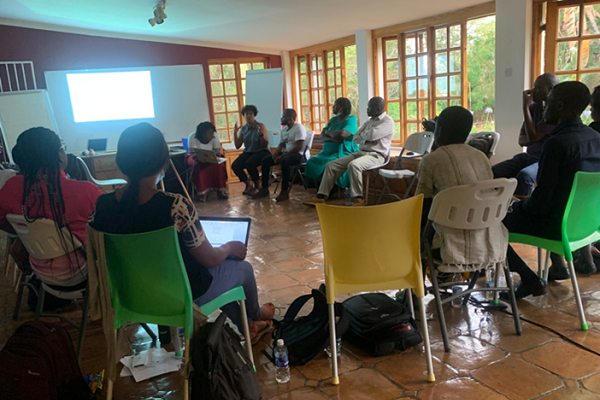
Harare ACRC research team and community researchers engaged in the PCP mapping process.
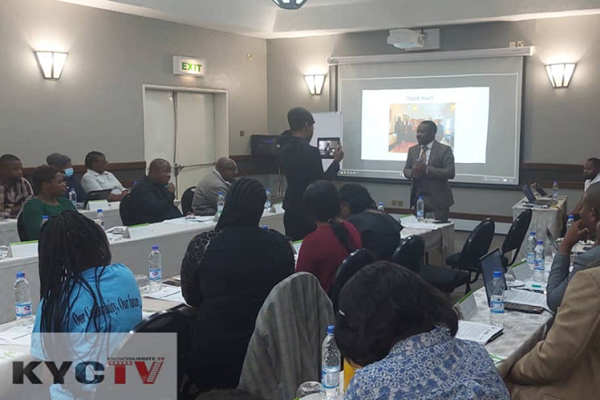
His Worship, the Mayor of the City of Harare, Councillor Jacob Mafume, presenting during a feedback session with development stakeholders and informal settlement representatives.
Finally, for the ACRC Harare research team, integrating community knowledge has demonstrated the potential to ensure that the community voice is upheld and to create institutional spaces for that voice to make contributions throughout the research process and report writing. Beyond the ACRC-organised meetings and dialogue platforms, community members were able to effectively engage with city technocrats and policymakers and better articulate their perspective.
More reflections on pushing the research frontier through community knowledge integration will transform this discussion from being merely a call for normative behaviour to one resulting in transformative and equitable research approaches. Even though urban research is yet to fully embrace multiple sources of knowledge, ACRC research experiences still offer a useful framework towards inclusive knowledge generation processes.
Photo credits: KnowYourCity TV Zimbabwe. Header photo description: Informal settlement representative making a contribution during a community knowledge session in Dzivarasekwa Extension.
Note: This article presents the views of the author featured and does not necessarily represent the views of the African Cities Research Consortium as a whole.
The African Cities blog is licensed under Creative Commons Attribution-NonCommercial-NoDerivatives 4.0 International (CC BY-NC-ND 4.0), which means you are welcome to repost this content as long as you provide full credit and a link to this original post.

